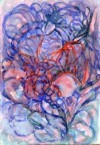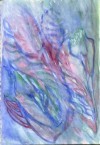|
|
||||
|
In Xanadu did Kubla Khan
A stately pleasure-dome decree: Where Alph, the sacred river, ran Through caverns measureless to man Down to a sunless sea. So twice five miles of fertile ground With walls and towers were girdled round: And there were gardens bright with sinuous rills, Where blossomed many an incense-bearing tree; And here were forests ancient as the hills, Enfolding sunny spots of greenery. |
In
Xanadu ließ Kublai
Khan
ein stattliches Lustschloß errichten, wo Alph, der heilige Fluß, lief durch Höhlen, unermeßlich dem Menschen, hinab zu einem sonnenlosen Meer. So wurden zweimal fünf Meilen fruchtbares Land mit Mauern und Türmen umgürtet. Und dort waren Gärten, blinkend mit gewundenen Bächen, wo zahlreich ein weihrauch-trächtiger Baum blühte; und hier waren Wälder, alt wie die Hügel, die sonnige Flecken grüner Lichtungen in sich bargen. |
||||
|
But oh! that deep romantic chasm which slanted
Down the green hill athwart a cedarn cover! A savage place! as holy and enchanted As e'er beneath a waning moon was haunted By woman wailing for her demon-lover! And from this chasm, with ceaseless turmoil seething, As if this earth in fast thick pants were breathing, A mighty fountain momently was forced: Amid whose swift half-intermitted burst Huge fragments vaulted like rebounding hail, Or chaffy grain beneath the thresher's flail: And 'mid these dancing rocks at once and ever lt flung up momently the sacred river. Five miles meandering with a mazy motion Through wood and dale the sacred river ran, Then reached the caverns measureless to man, And sank in tumult to a lifeless ocean: 
And 'mid this tumult Kubla heard from far Ancestral voices prophesying war! The shadow of the dome of pleasure Floated midway on the waves; Where was heard the mingled measure From the fountain and the caves. lt was a miracle of rare device, A sunny pleasure-dome with caves of ice! |
Aber
ach, diese tiefe romantische Kluft, die schräg abfiel
den grünen Hügel hinab, quer durch ein Zederndach! Ein wilder Ort, so heilig und verwunschen, wie er je unter einem abnehmenden Mond ward heimgesucht von einer Frau, die um ihren Dämonen-Geliebten weinte. Und aus dieser Kluft, in unaufhörlichem Aufruhr kochend, als ob diese Erde in schnellem, schweren Keuchen atmete, ward ein mächtiger Springquell jäh emporgetrieben, inmitten dessen raschen, stoßweisen Ausbrüchen riesige Brocken wirbelten wie prasselnder Hagel, oder wie spreuendes Korn unter dem Dreschflegel: Und inmitten dieser tanzenden Felsen, plötzlich und ewig, schoß jäh empor der heilige Fluß. Fünf Meilen mäandrierend in labyrinthischem Lauf durch Wald und Tal lief der heilige Fluß, erreichte dann die Höhlen, unermeßlich dem Menschen, und sank im Tosen zu einem leblosen Ozean hinab. Und inmitten dieses Tosens hörte Kublai von fern Vorväter-Stimmen, prophezeiend Krieg! Der Schatten von dem Lustschloß floß in der Mitte auf den Wellen, wo das vermengte Metrum zu hören war von dem Springquell und den Höhlen. Es war ein Wunder von seltener Kunstfertigkeit, ein sonniges Lustschloß mit Höhlen von Eis! |
||||
|
A damsel with a dulcimer In a vision once I saw: lt was an Abyssinian maid, And on her dulcimer she played, Singing of Mount Abora. Could I revive within me Her symphony and song, To such a deep delight 'twould win me, That with music loud and long, I would build that dome in air, That sunny dome! those caves of ice! And all who heard should see them there, And all should cry, Beware! Beware! His flashing eyes, his floating hair! Weave a circle round him thrice, And close your eyes with holy dread, For he on honey-dew hath fed, And drunk the milk of Paradise. |

Ein Mädchen mit einer Zither sah ich einst in einer Vision: Es war eine äthiopische Maid, und auf ihrer Harfe spielte sie und sang vom Berg Abora. Könnte ich in mir wiederbeleben ihren Wohlklang und Gesang, ein solch tiefes Entzücken würde es mir bereiten, daß mit Musik, laut und lang, ich dieses Schloß in die Luft bauen würde, dieses sonnige Schloß! jene Höhlen von Eis! Und alle, die zuhörten, sollten sie dort schauen, und alle sollten rufen: "Gebt acht! Gebt acht! Seine flammenden Augen, sein fließendes Haar! Webt einen dreifachen Kreis rund um ihn, und schließt eure Augen in heiligem Schauder, denn an Honig-Tau hat er sich gelabt, und getrunken die Milch des Paradieses." |
||||
|
|
|



